新概念英语第二册_Lesson77(共24页)
- 格式:pptx
- 大小:1020.56 KB
- 文档页数:29
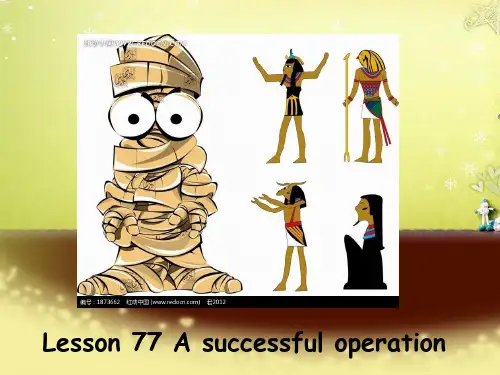
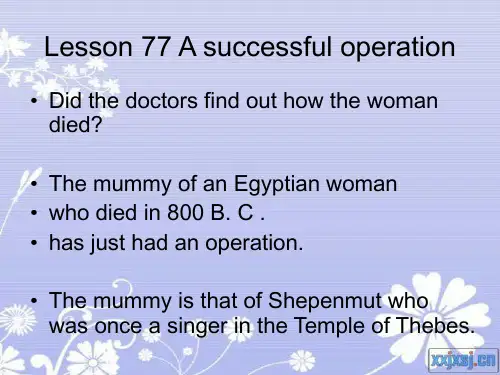
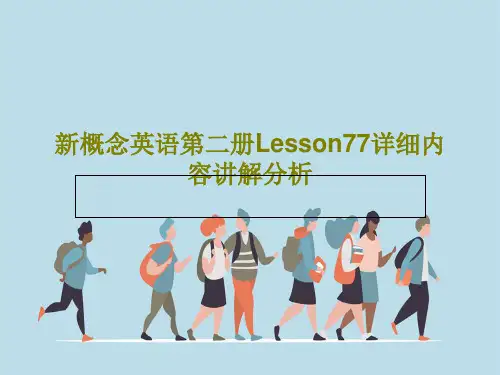
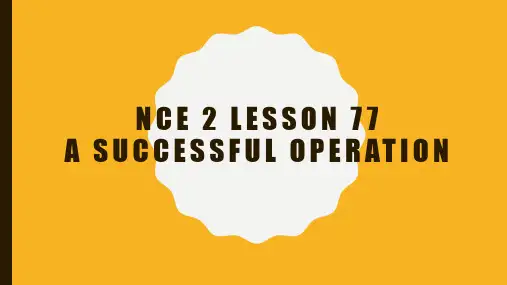
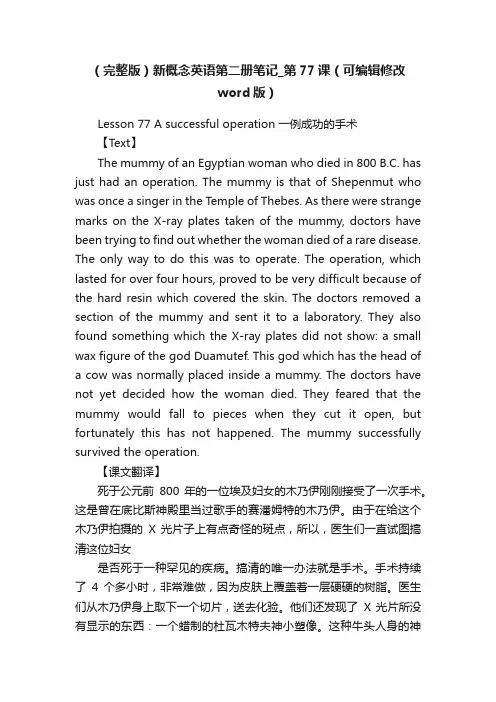
(完整版)新概念英语第二册笔记_第77课(可编辑修改word版)Lesson 77 A successful operation 一例成功的手术【Text】The mummy of an Egyptian woman who died in 800 B.C. has just had an operation. The mummy is that of Shepenmut who was once a singer in the Temple of Thebes. As there were strange marks on the X-ray plates taken of the mummy, doctors have been trying to find out whether the woman died of a rare disease. The only way to do this was to operate. The operation, which lasted for over four hours, proved to be very difficult because of the hard resin which covered the skin. The doctors removed a section of the mummy and sent it to a laboratory. They also found something which the X-ray plates did not show: a small wax figure of the god Duamutef. This god which has the head of a cow was normally placed inside a mummy. The doctors have not yet decided how the woman died. They feared that the mummy would fall to pieces when they cut it open, but fortunately this has not happened. The mummy successfully survived the operation.【课文翻译】死于公元前800 年的一位埃及妇女的木乃伊刚刚接受了一次手术。
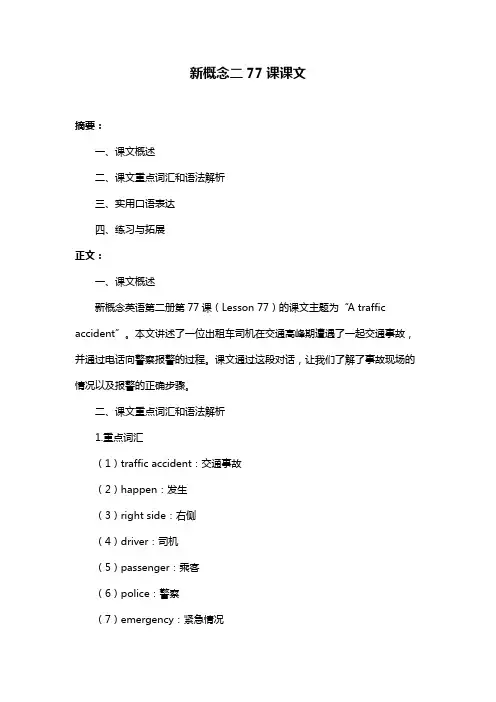
新概念二77课课文摘要:一、课文概述二、课文重点词汇和语法解析三、实用口语表达四、练习与拓展正文:一、课文概述新概念英语第二册第77课(Lesson 77)的课文主题为“A traffic accident”。
本文讲述了一位出租车司机在交通高峰期遭遇了一起交通事故,并通过电话向警察报警的过程。
课文通过这段对话,让我们了解了事故现场的情况以及报警的正确步骤。
二、课文重点词汇和语法解析1.重点词汇(1)traffic accident:交通事故(2)happen:发生(3)right side:右侧(4)driver:司机(5)passenger:乘客(6)police:警察(7)emergency:紧急情况(8)call:打电话(9)accident report:事故报告2.语法解析本文主要涉及到一般现在时、一般过去时和现在进行时的用法。
(1)一般现在时:用于描述事实、习惯或一般情况,如“I drive a taxi.”(我开出租车。
)(2)一般过去时:用于描述过去发生的动作或状态,如“An accident happened.”(发生了一起事故。
)(3)现在进行时:用于描述现在正在进行的动作,如“I"m calling the police.”(我正在打电话给警察。
)三、实用口语表达1.描述交通事故:- What happened?(发生了什么?)- There was a traffic accident./An accident happened./A car accident occurred.(发生了一起交通事故。
)2.报警:- I"d like to report an accident./I want to report an accident./I"m calling to report an accident.(我想报警。
)- What"s the address?(地址是什么?)- The accident happened at...(事故发生在……)- What"s the vehicle"s make and model?(车辆的品牌和型号是什么?)- Were there any injuries?(有人受伤吗?)四、练习与拓展1.根据课文内容,模拟报警电话对话。
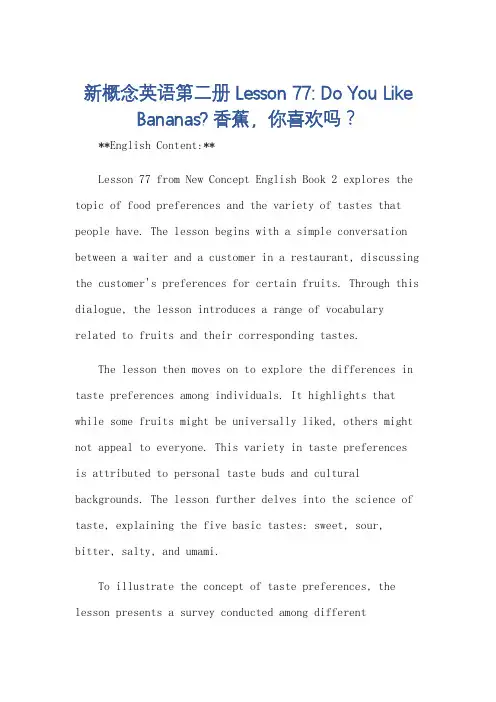
新概念英语第二册Lesson 77: Do You Like Bananas? 香蕉,你喜欢吗?**English Content:**Lesson 77 from New Concept English Book 2 explores the topic of food preferences and the variety of tastes that people have. The lesson begins with a simple conversation between a waiter and a customer in a restaurant, discussing the customer's preferences for certain fruits. Through this dialogue, the lesson introduces a range of vocabulary related to fruits and their corresponding tastes.The lesson then moves on to explore the differences in taste preferences among individuals. It highlights that while some fruits might be universally liked, others might not appeal to everyone. This variety in taste preferencesis attributed to personal taste buds and cultural backgrounds. The lesson further delves into the science of taste, explaining the five basic tastes: sweet, sour, bitter, salty, and umami.To illustrate the concept of taste preferences, the lesson presents a survey conducted among differentnationalities, asking them about their preferences for certain fruits. The results of this survey are fascinating, revealing that taste preferences are indeed influenced by cultural backgrounds. For instance, while bananas arewidely liked across the globe, some cultures prefer themripe while others prefer them green.The lesson concludes with a discussion on theimportance of variety in our diets. It emphasizes that a balanced diet should include a mix of different fruits and vegetables to ensure that we get all the essentialnutrients our bodies need. By understanding andappreciating the variety of tastes and textures that fruits offer, we can enjoy a healthier and more fulfilling diet.**Chinese Content:**新概念英语第二册第77课探讨了食物偏好和人们口味的多样性这一话题。
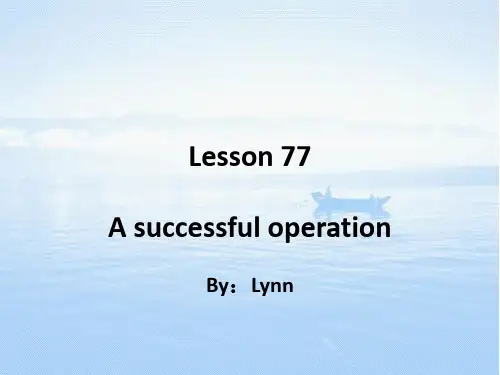
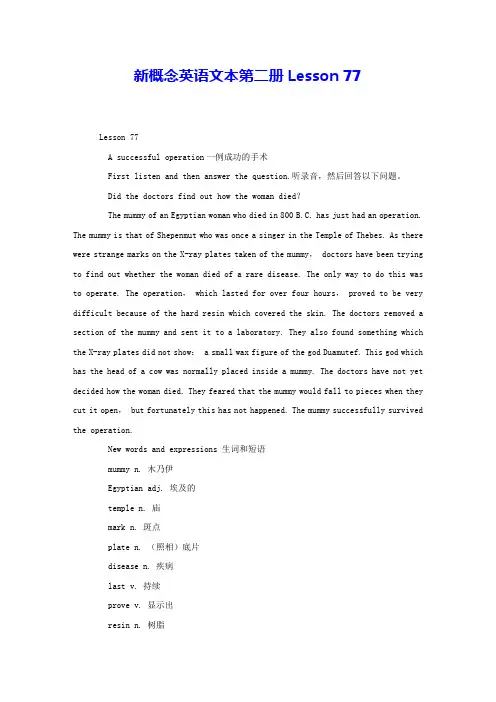
新概念英语文本第二册Lesson 77Lesson 77A successful operation一例成功的手术First listen and then answer the question.听录音,然后回答以下问题。
Did the doctors find out how the woman died?The mummy of an Egyptian woman who died in 800 B.C. has just had an operation. The mummy is that of Shepenmut who was once a singer in the Temple of Thebes. As there were strange marks on the X-ray plates taken of the mummy, doctors have been trying to find out whether the woman died of a rare disease. The only way to do this was to operate. The operation, which lasted for over four hours, proved to be very difficult because of the hard resin which covered the skin. The doctors removed a section of the mummy and sent it to a laboratory. They also found something which the X-ray plates did not show: a small wax figure of the god Duamutef. This god which has the head of a cow was normally placed inside a mummy. The doctors have not yet decided how the woman died. They feared that the mummy would fall to pieces when they cut it open, but fortunately this has not happened. The mummy successfully survived the operation.New words and expressions 生词和短语mummy n. 木乃伊Egyptian adj. 埃及的temple n. 庙mark n. 斑点plate n. (照相)底片disease n. 疾病last v. 持续prove v. 显示出resin n. 树脂skin n. 皮肤section n. 切片figure n. (人的)体形;人像normally adv. 通常地survive v. 幸免于参考译文死于公元前800年的一位埃及妇女的木乃伊刚刚接受了一次手术。

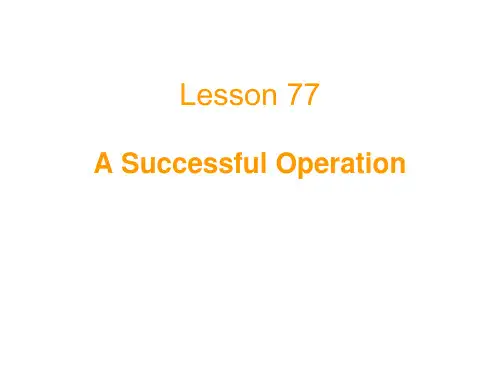
Lesson 77 A successful operation一阅读课文The mummy of an Egyptian woman who died in 800 B.C. has just had an operation. The mummy is that of Shepenmut who was once a singer in the Temple of Thebes. As there were strange marks on the X-ray plates taken of the mummy, doctors have been trying to find out whether the woman died of a rare disease. The only way to do this was to operate. The operation, which lasted for over four hours, proved to be very difficult because of the hard resin which covered the skin. The doctors removed a section of the mummy and sent it to a laboratory. They also found something which the X-ray plates did not show: a small wax figure of the god Duamutef. This god which has the head of a cow was normally placed inside a mummy. The doctors have not yet decided how the woman died. They feared that the mummy would fall to pieces when they cut it open, but fortunately this has not happened. The mummy successfully survived the operation.二单词解析(一)lastVerb1.(过程、活动、状态)持续,继续Childhood seems to last forever. 童年似乎永不终结。